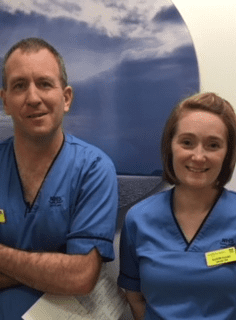#WorldDiabetesDay: The role of podiatrists during the COVID-19 pandemic
13 Nov 2020
“Our nursing colleagues throughout the hospital have been part of the driving force behind our response to COVID 19. Locally I had the pleasure of being part of that, working within the Vascular Rapid Access Clinic. The Impact of COVID 19 and the closure of outpatient provision resulted in this service increasing to three days per week and was led by the Consultant Vascular Surgeons.”

Ahead of #WorldDiabetesDay tomorrow, Sheryl Braidwood FFPM RCPS (Glasg) from our Faculty of Podiatric Medicine has written this guest post about the vital role podiatrists have played in managing NHS services throughout the COVID-19 pandemic.
As we raise awareness of this challenging illness, we’re proud of the contribution all our AHPs make to patient care thoughout the world each and every day.
Prior to the Covid 19 outbreak, I worked as a Advanced Podiatrist in the Foot Protection Team within NHS Greater Glasgow and Clyde. Based at the Queen Elizabeth University Hospital the Podiatry Foot Protection Team is privileged to work as part of high risk foot MDT. We have strong links to Diabetes, Infectious Disease Consultants, and Renal Consultants, Orthopaedic surgeons, Orthotics and Vascular Surgery services. The impact of COVID 19 has not only strengthened the links by adapting to a virtual world, its created new extended links to the services provided in the community.
Our nursing colleagues throughout the hospital have been part of the driving force behind our response to COVID 19. Locally I had the pleasure of being part of that, working within the Vascular Rapid Access Clinic. The Impact of COVID 19 and the closure of outpatient provision resulted in this service increasing to three days per week and was led by the Consultant Vascular Surgeons. We were invited to work alongside our Vascular Nurse Specialists Drew Davidson and Alison Duncan.
The Rapid Access (Hot) Clinic is for emergency care; the patient who needs immediate review and perhaps intervention. It hosted 120 clinical sessions within COVID restrictions to date and can review up to 10 patients per session. Patients presented with an array of life and limb threatening concerns including critical limb threatening ischaemia, deteriorating wounds, and uncontrolled infection, clinical signs of sepsis, life altering pain, and post-operative complications.
With all Nursing and Podiatry services altering structure due to COVID 19, shared care, communication and treatment plan discussions became a challenge. Patient’s anxiety levels were noticeably increased with most of them only attending as they required attempts at limb salvage. Many had shielded and were too afraid to report rapid deterioration, many in unmanageable pain. Emotions were often high as some patients could not be offered a viable intervention due to a delay in presenting or the restrictions in place.
Drew and Alison provide a calm, experienced approach to what is often a stressful, hectic environment. We worked closely to learn from each other, new skills to ensure that we could assist in other tasks not just the lower limb assessments and wounds. Our prescribing ability was utilised to allow our patients quick access to the appropriate treatments. Our specialist nursing colleagues patiently provided guidance to Podiatry community staff who rotated though, forging professional networks with links and points of contact locally.
The NHS GG&C Podiatry Service absorbed responsibility for all foot wounds to assist our District Nursing colleagues through this period, significantly increasing our caseload and providing a different demand of case load profile. Prior to Covid 19 the Podiatry service reported 37,969 patients (21.5%) have a diagnosis of Diabetes, therefore robust prevention and protection pathways is imperative.
The links created and meticulous communication by our Vascular Nursing colleagues provided robust support for the Podiatry teams across the service. The Podiatrists in community are now responsible for the care of and increasing number of the most at risk patients. Providing this in a domiciliary setting creates more challenges. They are able to have a direct line of contact with specialist nurses and be supported though any changes to dressing regimes etc.
NHS Podiatry Service is also trialling a mobile photography application which is allowing the safe transfer of medical images to our patient records. The multidisciplinary team were able to rapidly and remotely access patient images and assist a clinical decision with an insight to the wound.
Our Vascular Service has overarching access for other health boards and some patients travelled as far as the Islands for care. It was Alison and Drew’s role to adapt that communication and ensure the local Nursing teams all had up to date information. This must be an enormous task, however it makes a significant impact of the quality of the patients’ care and journey.
Throughout this challenging period NHS services and colleagues have adapted, educated and supported each other through a turbulent landscape. It has been a pleasure to work and continue to learn from our nurse colleagues, improving our approach to MDT working and rapid access to services for a vulnerable patient group.
Latest news and statements
Key priority areas
Topics
- Workforce
- Wellbeing
- Equality, Diversity and Inclusion
- Climate Change
- Health Inequalities
- College
- Obesity
- COVID-19
Archive
Key links
Tweets by @rcpsglasgow